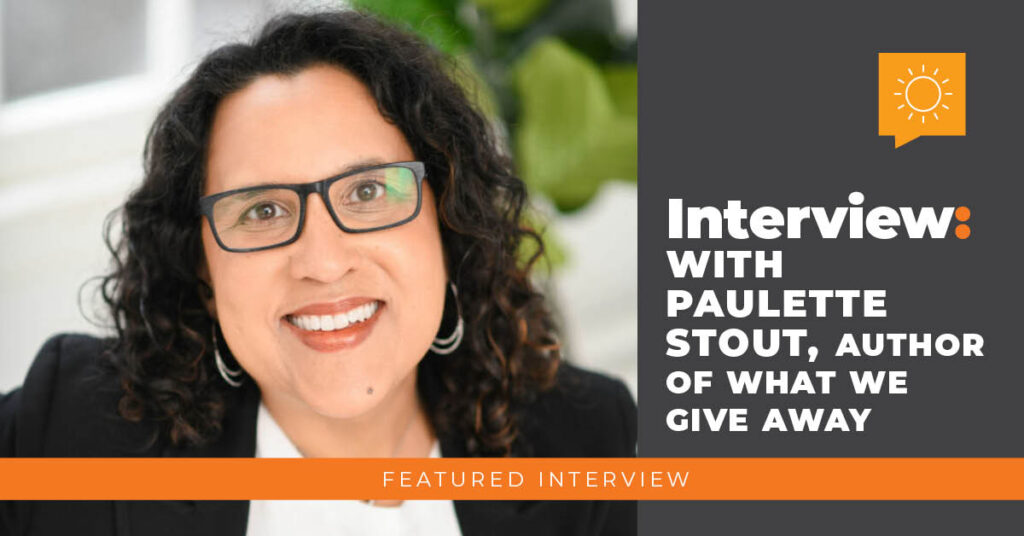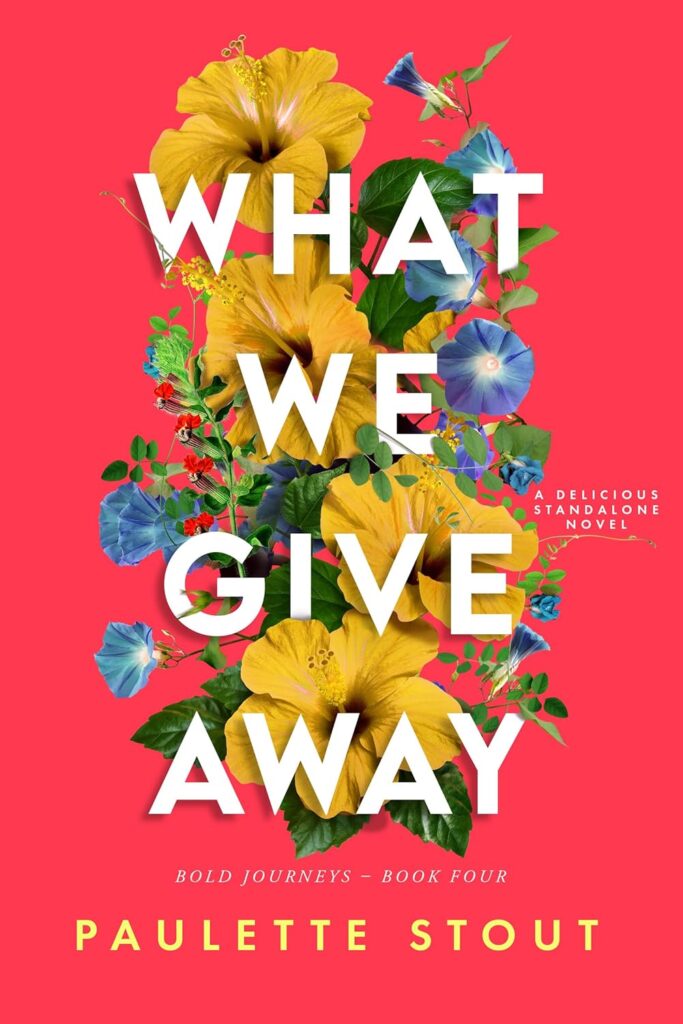Author of What We Give Away (Bold Journeys Book 4)
By Christina Consolino

Author and podcaster Paulette Stout is one to watch! She writes “contemporary fiction with high-stakes substance and delicious spice,” and stories featuring “social issues often ignored.” She owns her own content marketing company, prioritizes self-care, and is just as comfortable lifting up other writers as she is wordsmithing. She’s the author of the Bold Journeys series, which she describes as “bingeable contemporary fiction that says the quiet things out loud.” The books, which can all be read as standalones, are engaging, authentic, and inspiring stories about independent women with the capacity to live on their own terms.
What We Give Away, Book 4 of your Bold Journeys series, went on sale earlier this year. Congrats! How different was the launch of this book compared to your first?
PS: It was worlds apart! The book landscape is far different than it was in 2021. I’ve built relationships, a following, and a base of experiences that make every release easier than the last. Plus, the more I write, the more confident I get in my storytelling. That makes me eager, and way more confident, that what I’m putting out will delight readers. What We Give Away has received a consistently phenomenal response from readers and has already won two book awards. I’m very proud of this book.
The novel features Leslie, a journalist who “dives into diet culture and eating disorders.” How and why did you decide to feature this important and pervasive topic?
PS: Each of my books center on a social issue. Fiction is such a compelling way to start important social conversations. Weight and body image is something so many of us struggle with. We internalize so much toxic energy, feeling wrong in our skin. And I’m so proud that with What We Give Away, I was able to explore the destructive force that is diet culture, a concept many have never heard of before but are impacted by every day. Those in large bodies jump on the fruitless hamster wheel of weight loss. Those in smaller bodies live in fear of gaining an ounce. What We Give Away is motivating readers to rethink the energy they spend fretting over their bodies and rechannel that zeal into activities that bring them joy. This life-changing response has been incredibly rewarding. Did you discover anything surprising in your research for the story?
PS: I’d always viewed the harms of dieting from a larger-bodied perspective. But in researching the book, I learned about anorexia nervosa and realized that stigmatizing large people harms everyone. Anorexia is founded on a distorted body image and the fear of getting too heavy. However, many undiagnosed sufferers of anorexia live in large bodies. These people are told the answer to their problem is to lose weight, forcing them deeper into the very behaviors that are causing them so much harm. Anorexia is a mental disorder and can happen to people at any body size. That discovery was eye-opening learning.
The book also features Puerto Rican recipes, which are available for free if you sign up for your newsletter. How did you decide which recipes to share? What is your favorite shared recipe and why?
PS: When I sent out my book boxes, I included spices and my favorite recipe for pork chops. It’s ridiculously easy and near foolproof. Salt, pepper, garlic, and oregano is my go-to flavor combination. I included foundational recipes of Puerto Rican cuisine that are both tasty and easy to prepare. Food is such a central focus of the book, and I’m so glad readers experienced what a positive celebration it can be.
Speaking of food—my mother’s Italian cooking was great, but I didn’t encounter any other food culture until college—and your Instagram post asking, “How do you sofrito?” intrigues me. For those who might not know, what is sofrito? What do you include in yours, and what do you use it for? Anything that doesn’t belong in sofrito?
PS: Sofrito is a seasoning base that forms the foundation of many Puerto Rican dishes. It includes garlic, onions, tomatoes, cilantro, green and red peppers, alongside a variety of specialized peppers and herbs you’ll only find in Hispanic areas. I freeze mine in ice cube trays and use it in rice and beans, mostly. But it also enhances other dishes like roasts and stews. You can buy it jarred from Goya in most grocery stores but making it from scratch can’t be beat.
You have a reputation for writing spicy books. What role does intimacy play in your storytelling?
PS: For many, on-page sex makes a book less legitimate or noteworthy. Other readers get uncomfortable, likely, because too many are taught from a young age that sex and pleasure are self-indulgent and wrong. But I think that’s a fundamental misunderstanding of the role intimacy plays in our lives, and by extension in books. Intimacy is a powerful storytelling tool. On-page sex can open the door to a character’s deepest desires and inspire them to strive for more—in and out of the bedroom. Intimate scenes offer conflict, tension, and imbalanced power structures. They enable us to explore social mores, introduce backstory, deepen texture by using all five senses, and so much more. All that power is wrapped up in one scene. Sex is so essential for life that, for me, writing romantic relationships without intimacy would be like writing a symphony without sound.
In addition to writing, you co-host The Best of Book Marketing with fellow author Lainey Cameron. How’s the podcast coming along? Have you faced any challenges? What are your goals for the remainder of the year?
PS: Thanks for asking! The show is gaining momentum as more authors find us and the amazing book marketing tips the show provides. We’re so proud of the impressive lineup of topics and guests, from working with bookstores, to book blurbs, author newsletters, and so much more. Looking ahead, we’ll be focusing on topics listeners have been asking about, like Facebook and Amazon ads, cover design, and even ethically using AI. We live stream every episode on YouTube, Instagram and Facebook, so if people listen live, they can have their questions answered in real time. Show times vary, so follow @bookmarketingpodcast on social media so you know when we’re going live.
This year has been difficult for many, including writers, artists, and other creatives. How have you found a proper balance to keep writing while in the midst of turmoil?
PS: It’s been a struggle for me, as well. But I’ve found my way back by focusing on projects that bring me joy. For instance, I stepped away from my current WIP to write a second edition of my debut novel, Love, Only Better. Re-editing that book is like coming home to a familiar friend, and it’s the comforting creativity I needed. I’m still passionate about my next project, but it’s important to let our creativity guide us. If writing isn’t satisfying or has become a drain, we need to give ourselves grace and step away. Refill the tank in whatever way works for us: talking with other writers, reading books, walking in nature. I love going to art museums. Absorbing someone else’s creativity inspires my own. When we’re feeling stressed and detached, we need to address that before expecting our creativity to flow unhindered. It’s always wise to listen to our bodies. They won’t usually steer us wrong.
As always, what’s next for you?
PS: After I finish the second edition of my debut, I’ll return to my WIP, which explores the pressures women face to be part of a couple. I’m excited to return to this story—when the time is right. I’m also joining an anthology that aims to release later this year. With a demanding full-time job, my life is busy. But I’m always grateful for the opportunity to return to the page.

What We Give Away
Paulette Stout
Food, lies and second-chance love make for a delicious dish. So why can’t Leslie take a bite? When NYC investigative journalist Leslie Molina-Allen leaves town to care for her beloved Aunt Dot, she never expects to be tossed into the orbit of her first—and only—love, Chef Risto. Or end up working at his restaurant. For as long as Leslie can remember, food has been the enemy. Something to be mastered, not enjoyed—or so her mother says. And Risto’s unapologetic appetite for life is everything Leslie has spent years trying to forget. With a booming restaurant and a skyrocketing reputation, Chef Risto has everything he’s ever wanted. Except Leslie. She lost interest in him long ago—but still manages to haunt his dreams every night. So when she turns up to fill in for Dot, days become unbearable too.

